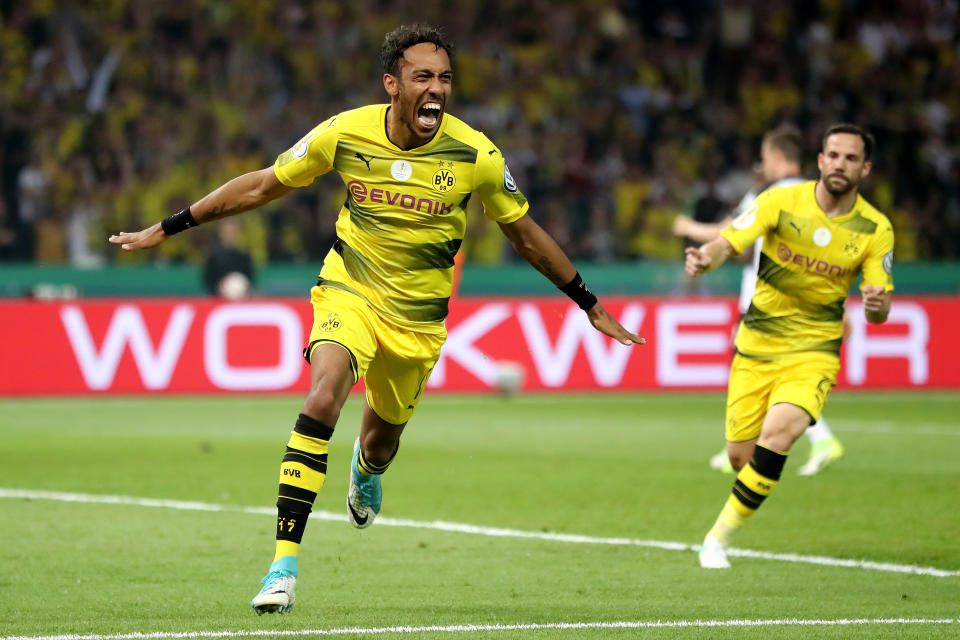Arsenal's Pierre-Emerick Aubameyang signing might not be the coup it appears

While Pierre-Emerick Aubameyang was developing into one of the world’s best strikers, he simultaneously developed into something else: He had become somewhat of a mythical figure in the transfer market, the go-to name for rumor-disseminators when a superclub’s fans clamored for a new forward. But it was unclear how close he ever truly came to leaving Borussia Dortmund.
And now suddenly he’s gone.
He’s off to Arsenal for $78.5 million. He’ll reportedly earn $12.4 million per year plus bonuses. He’s the most expensive player in club history, and the truest replacement for Alexis Sanchez.
He’s also seemingly a bargain. It’s as if Arsenal paid Aubameyang’s 2016 price in a market that has long since left 2016 prices behind. The Gabon international has been one of the most prolific goalscorers in the world for years, and, disciplinary suspensions aside, has shown few signs of slowing down. His pace remains irreplaceable. His combination of that and predatory instincts have made him nearly unparalleled over the past few seasons.
And yet there is something unsettling about this deal. Something unsettling about its relative abruptness. Something unsettling about the market in which it was struck.
Aubameyang had long agitated for a move. He had long been the subject of interest from top clubs around Europe, or so we were led to a believe. And Arsenal, for ages, had refused to loosen Arsene Wenger’s purse strings. Now, in a span of a few weeks, Dortmund has heeded Aubameyang’s demands; Arsenal has written a big, fat check; and, curiously, no other European footballing power even considered writing a similar one.
That’s the slightly disconcerting question here: Why did the market dry up? Why didn’t Arsenal have price-inflating competition for Aubameyang’s signature? And why is Dortmund only now willing to sell at a price that surely hasn’t blown it out of the water?
There are several theories. Perhaps other clubs have been put off by Aubameyang’s attitude throughout his final months in Germany. He was dropped in November for “disciplinary reasons,” then again this month for missing a team meeting. Perhaps there is further intel that hasn’t been, and won’t be, made public.
Or, maybe, clubs have connected two easily discernible dots: One, that Aubameyang is 28; and two, that his game is heavily dependent on pace. Pace is often the first of a player’s attributes to go, and with it would go Aubameyang’s excellence.
Aubameyang is more than just a speedster, though. He very well could have three or four more prime years remaining in his legs. Thus, at less than $80 million, he would seem to be worth the risk.
The problem isn’t the risk itself; it’s that Arsenal is the club taking it. That’s where the disconnect lies. The Gunners have both the oldest and worst squad of the Premier League’s Big Six. They are not in contention for meaningful trophies, and aren’t all that close either. Aubameyang would represent an excellent short-term talent infusion for a club battling for a title. But a short-term talent infusion isn’t what Arsenal needs.
Arsenal needs a foundational rebuild. Instead, its first two building blocks of the post-Alexis Sanchez era were a 28-year-old and a 29-year-old that will cover up cracks beneath them. Oh, and they effectively cost more than $100 million. For a club previously so frugal, so careful to make good investments in the market, that’s a stunning 180-degree turn. And probably not a very smart or timely one, given the circumstances.
Could Aubameyang and Henrikh Mkhitaryan recapture the magic of their Dortmund days? Sure they could. And sure, they could lead Arsenal to the Champions League via a comeback in the top-four race. (Aubameyang is ineligible to play for Arsenal in the Europa League.)
But to provide a worthwhile return on investment, they’ll have to perform beyond this year and next. They’ll have to be key pillars of the rebuild in their early 30s. That scenario isn’t implausible. But it’s not likely, either.
Arsenal must be confident in it. More confident than any of its Premier League or continental rivals. The Gunners are betting on their recently revamped scouting and recruitment departments. They’re betting on themselves.
It’s not the first time they’ve bet on themselves. And it wouldn’t be the first time Wenger has won such a bet. But it certainly wouldn’t be the first time he’s lost one. So there is plenty of reason to be skeptical.
– – – – – – –
Henry Bushnell covers global soccer, and occasionally other ball games, for Yahoo Sports. Have a tip? Question? Comment? Email him at henrydbushnell@gmail.com or follow him on Twitter @HenryBushnell.



